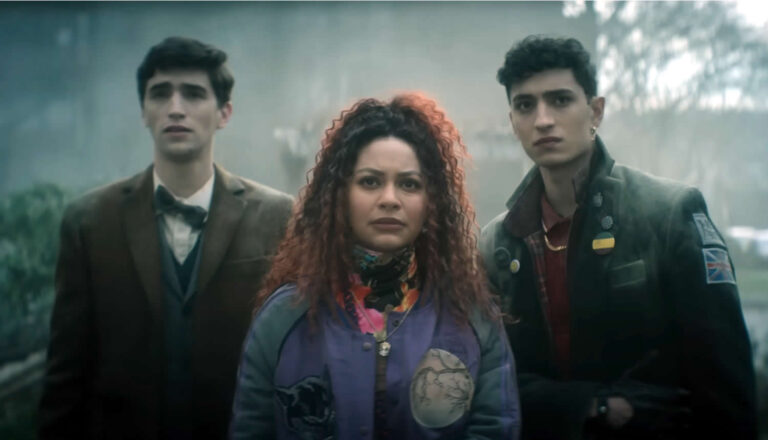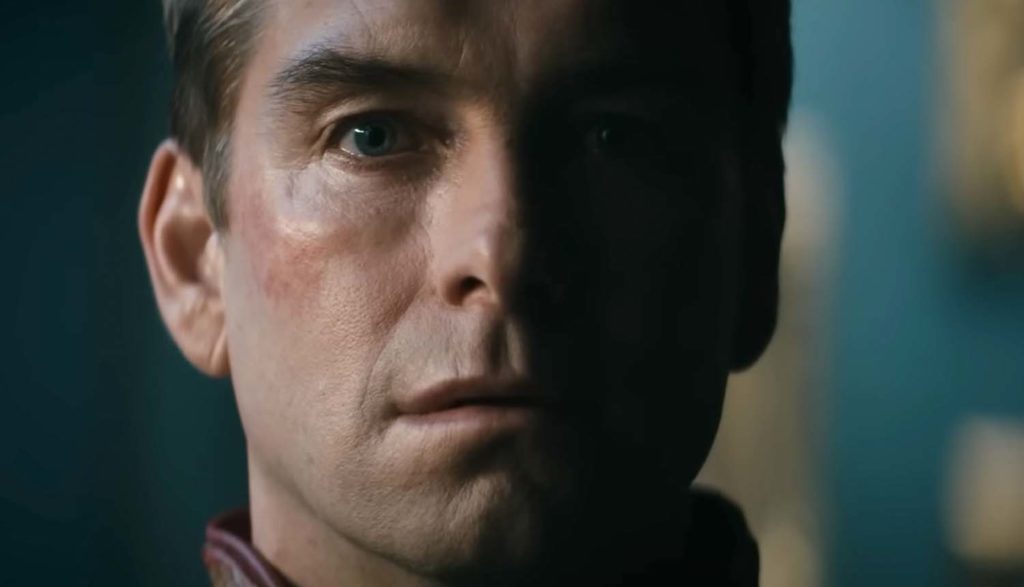
Dead Boy Detectives
Dead Boy Detectives targets teens in style and story. But it comes with very adult, problematic content.

Heroes can fail us. Even superheroes. Especially superheroes.
Hughie Campbell knows this better than most. One afternoon, he and his girlfriend were talking about moving in together and the next—well, his girlfriend had become a pair of disembodied hands and a bunch of blood spattered on the street. That’s what happens, apparently, when a super-fast hero like A-Train plows into a flesh-and-blood person. And while A-Train said he was sorry and all, he was also high on drugs, and Hughie understandably still harbors some ill will … and a well-founded suspicion or two about just how super these superheroes really are.
He’s not alone. Hughie spent some time with The Boys, a rough-hewn squad of vigilantes dedicated to exposing society’s most hypocritical heroes: Do-gooders fighting other do-gooders, if you will. Only the latter are do-badders and the former do bad things to make good on their …
Never mind. Let’s just get on with the review.
Hughie and The Boys don’t have a lot of advantages in this fight. Led by the mysterious Billy Butcher, The Boys (at least one of whom is female and sometimes called, appropriately enough, “The Female”) don’t have superpowers at their disposal. But that’s all slowly changing.
Thanks to the newly founded FBSA (Federal Bureau of Superhuman Affairs), The Boys are backed by the government with everything they need to put the corrupt “good guys” behind bars. And this includes a new drug called V24, a variant of the Compound V formula that created many superheroes to begin with. Of course, V24 wears off after 24 hours, so they’ll need to work fast if they want to take on a Supe.
In contrast, their adversaries are seriously supercharged (and permanently so)—particularly the members of the so-called Seven—an Avengers- or Justice League-like supergroup led by Homelander, the group’s exclamation point. He’s a Superman-esque hero in a star-spangled cape who can fly, knock down buildings without getting short of breath and zap anyone he’d like with his heat-ray vision. And while everyone thought he was the cleanest, most idealistic of the bunch, his All-American persona was wrecked in Season 2 when it came out that his superpowered girlfriend, Stormfront, was a former Nazi.
Yeah, that certainly put a hitch in the step of Vought International, the brand behind the superhero business. Their response to the PR nightmare is to promote Starlight, the Seven’s most wholesome member (who previously helped The Boys due to her romantic relationship with Hughie) to co-captain of the Seven with Homelander. Suffice it to say that Homelander isn’t pleased. Where once he donned a relaxed smile for his adoring fans, now he bears a borderline homicidal grimace as members of the press grill him about his Nazi dalliance and recent demotion.
Based on a 2006-08 comic series of the same name, Amazon’s The Boys is all about deconstructing the American superhero myth and, by extension, satirizing America itself. Or, at least, the America its creators see.
It’s a natural impulse to flip superheroes upside-down—and, perhaps, a necessary reminder of the corrupting nature of power. Not every cat with superpowers, after all, necessarily has super-great character to go along with them. And even if a hero starts out with the best of intentions, how can we be sure that he or she will follow through on them?
This is not exactly unexplored territory.
DC’s Watchmen is perhaps the most famous example, but there have been others. Even legitimate superhero narratives in Marvel and DC have poked around the dangers of unchecked superhuman beings. Captain America: Civil War explored the theme of how a world would deal with, essentially, god-like vigilantes (well-meaning tho’ they might be).
But The Boys feels bleeding-edge relevant, too—an exploration of hypocrisy and dubious authority that contains feints toward everything from police brutality to the #MeToo movement to corporate oligarchy. Power corrupts people, The Boys suggests, be they superheroes or business syndicates. And it’s an uphill battle to bring the corrupt to justice.
But The Boys itself may corrupt in a different sort of way.
The Amazon show is billed as a dark comedy. And it is indeed as bleak, cynical and brutal as they come. The superheroes here engage in the worst acts you can imagine, from sexual assault to murder, and we see most of those crimes. Bodies explode before our eyes. Sex and nudity oozes across the screen. (And sometimes these things aren’t mutually exclusive.) Even many of the less-heinous heroes come across as rather vile human beings. And the language—well, let’s just say we’re a long way from Robin shouting, “Holy hand grenades, Batman!”
And if these so-called superheroes don’t deserve the title, the show’s actual heroes aren’t always a lot better. In the very first episode, they kill a supe and then spend much of the next two episodes trying to dispose of the body. When your protagonists are led by a guy called The Butcher, you know you’re in some pretty murky territory.
The show’s more serious social commentary comes with plenty of issues, too. The Boys critiques everything quintessentially American, if you will—or, at least, the idyllic vision of America pushed in the 1950s. As such, religion becomes a critical focus of this deeply cynical show. Perhaps the best illustration comes from Starlight, whose real name is Annie: She starts Season 1 as an innocent Christian—a one-time member of the so-called Capes for Christ movement—who has some legitimate questions about the faith she was raised with. By later seasons, she sees her former faith as bankrupt as the rest of America’s institutions.
“I should’ve done a lot more stuff [when I was younger],” Annie confesses to a fellow supe, “because there is nothing up there. There’s nobody in the sky watching over us. Not God, not Homelander, not anybody. It’s all just … lies.”
The Boys offers a lively, grotesque, culture-current take on the misuse of power. But ultimately, the power is yours. And perhaps the best use of that power would be to avoid this streaming show like kryptonite.
Billy and The Boys work for the FBSA, taking down corrupt Supes and reporting to Hughie, who has a strict no-kill policy. Meanwhile Starlight is promoted to co-captain of the Seven, much to Homelander’s chagrin.
We see full-frontal male nudity (and an extreme close-up of male genitals). Characters of both genders engage in sexual activity (including same-sex pairings), and we see lots of skin (though most critical bits are hidden by camera angles). A man shrunken in size has sex with a doll while people cheer him on. A man puts his genitals in a woman’s hand so she can perform a sexual act (his genitals are kept off-camera, but we see everything else). We hear a woman reported a superhero for a sexual offense. People talk and joke about sex, masturbation and sexually transmitted diseases. A couple kisses. A man is uncomfortable that his girlfriend is flirting with her ex-boyfriend (whom she lost her virginity to). A man who wants to fix things with his ex-wife is unable to since she is now dating someone else.
A superhero known as Termite (who can shrink his size down to millimeters) kills his boyfriend during a sexual act. (In miniature, he enters the man’s urethra then accidentally sneezes, returning to normal size and exploding the man’s body.) When a member of The Boys catches him dripping in the man’s organs, Termite shrinks down again and tries to kill the man in a similar manner by entering the man’s rectum (though this is prevented). In another violent sexual act, a man rips out his female lover’s hair (by her request) while they have sex.
Supes use their powers to beat up each other and non-powered government agents. In one fight, a woman uses her powers to blow up her opponent’s hand, then head, then whole body. A movie shows the Seven taking down Stormfront with their powers after learning she’s a Nazi. (Buildings in the background burn and topple.) Homelander is physically aggressive towards many people. Someone makes a murder-suicide joke. A young boy says he has nightmares about his own father (a superhero) killing him. Someone mentions burying dead prostitutes. We see video footage of two superheroes abandoning a crashing plane, allowing the people onboard to die.
People snort cocaine. While in miniature form, Termite is thrown into a bag full of cocaine, which he accidentally ingests. Upon release, he vomits and nearly dies of an overdose. Starlight’s ex says she snuck into a cantina when she was 19 and got drunk (and then puked onstage in front of a crowd of people afterwards). We learn Billy has remained sober the past year in order to care for his dead wife’s son.
We hear lots of racist commentary from Stormfront (both the scandalous superhero and a woman playing her in a film). Homelander says humanity doesn’t need a “master race” because he is the master race. A man is shamed for his recent weight gain. We hear that a woman sent her opponent a box of cat feces. The FBSA makes deals to release convicted superheroes in exchange for money and other heroes being placed behind bars instead.
A superhero claims he escaped a religious cult. Superheroes talk about leaving the Christian faith and make jokes about their religious upbringings. A Vaught executive admits the company shouldn’t have made superheroes objects of worship since it corrupted them.
We hear multiple uses of the f-word, s-word and c-word. We also hear multiple uses of “a–,” “a–hole,” “b–ch,” “b–locks,” “c–k,” “d–k,” “p-ss,” “tw-t” and “w–ker.” God’s and Christ’s names are abused (the former sometimes paired with “d–n” and the latter sometimes paired with the f-word).
Hughie and the rest of The Boys try to regroup from the events of the Season 1 finale, especially the absence of their leader, Billy Butcher. Hughie and Annie plot to swipe some Compound V from Vought’s labs. Meanwhile, Homelander—fresh off of his murder of Vought Vice President Madelyn Stillwell—tries to make himself not just leader of The Seven, but the all-powerful dictator over Vought as well. But he finds unexpected resistance in the form of Vought’s steely, ruthless CEO, Stan Edgar.
Hughie and Annie’s conduit to the compound is a superpowered lab tech nicknamed Gecko—a former friend of Annie’s from their Capes for Christ days. He’s fallen far from the faith, though, and is now working part-time as a supercharged S&M male prostitute: He brings a “customer” into a hotel and allows the man to hack off his arm. (Blood flies as the guy lustily chops at the meat with a machete, and we see the severed arm lying on a nightstand.) Gecko’s arm rapidly (and grotesquely) grows back: Gecko tells his customer that, for another $1,000, he’ll allow him to cut off his penis.
“Where’s the closest ATM?” The guy says.
And that’s arguably not the grossest scene in the episode, by the way. That might be when a woman’s head literally explodes, spraying others with blood and gore. Several throats are sliced open (with more blood gushing everywhere), and a man is beheaded: A hero totes around the severed cranium like a prize. Someone is stabbed through the chest with a sword. Another guy gets mauled by a flying boat, apparently. (We only see the “attack” in grainy surveillance footage, but the nearly destroyed arm is on full, bloody display.) A blind man is punched in both ears: The man screams in pain and falls to the ground as blood pools around the writhing body. A superpowered terrorist causes a massive explosion with his overheated body. We see Edgar negotiate a contract that promises a superhero will make “best efforts to avoid collateral damage.” The language is intentionally soft, and Edgar admits that they build in a “34% casualty allowance.”
Annie/Starlight tells Gecko that she’s lost her faith, and they both make some disparaging remarks about the conservative Christian belief system they were raised in. They reminisce about a passion play they were both in. (“You were the best Jesus,” she tells him. “No one can take a nail through the palm like I can,” says the regenerative Gecko.) Annie sings at a church-based funeral for a fellow superhero. Another supe—who’s down on his luck—is recruited to join something called the Church of the Collective, promising that the church will help him get back on his feet and return to prominence.
The Boys are staying with a really unsavory gang that is involved with, among other things, human trafficking. “They promised me they would only smuggle in guns,” Frenchie, a member of the Boys, whines. “And cocaine and Fentanyl.”
Homelander, satisfying a curious fetish, drinks a bottle of breastmilk that came from Stillwell—the woman whom he murdered. A superhero gets seriously drunk and causes a disturbance that lands him in jail. Homelander calls a talented blind superhero a “cripple.”
We see Annie in a bra and panties. She and other female superheroes wear provocative costumes, and Vought is clearly sexualizing Annie’s public persona. There’s a graphic reference to bodily fluids. Someone is blackmailed. We learn the founder of Vought used to be a Nazi doctor.
Characters say the f-word 45 times (and we may hear others in some background music), the c-word twice and the s-word another 17 times. We also hear “a–,” “h—” and “p-ss,” along with the British profanity “b–locks.” God’s name is misused five times (three with the word “d–n”), and Jesus’ name is abused four times.
The public loves its superheroes, especially members of The Seven—an Avengers/Justice League-style squad with very posh facilities at Vought’s corporate headquarters. But most of its members—and, apparently, most superheroes in general—aren’t the virtuous paragons they pretend to be.
One hero, A-Train, races through a woman, completely obliterating her. Her boyfriend, Hughie, is left holding her hands—the only thing left intact—while the rest is a spray of blood and bone. (We see part of her spine fly around in slow-motion.) Later, A-Train jokes with another supe that he swallowed one of her molars “like a bug on the f—ing freeway.”
Another member of The Seven, The Deep, drops his drawers (we see his rear end) and blackmails the newest member (Annie, aka Starlight) into giving him oral sex. She apparently does so, and we see her crying in the bathroom later. (“I just heard my mom’s voice in my head,” she confesses to a near-stranger still later. “’Keep smiling. The show must go on.’”) Another hero takes down a private plane containing, among others, an American mayor and his son, who just that day was given a treasured, autographed picture of that self-same hero.
One hero uses his powers of invisibility to spy on women in the bathroom. His clothes don’t disappear, so he has to work naked; we see him materialize and show his full-frontal attributes. Hughie and Billy Butcher, head of The Boys, sneak into a superhero nightclub. There they see two naked superheroes have sex while hovering above the room. (We see a woman’s breasts.) Another mouse-sized hero takes a running start and apparently dives into a woman’s anatomy. Another hero—a stretchy, snake-like guy, passionately kisses two other guys. Another hypocritical wrinkle to his brief character: His name is Ezekiel, and he’s apparently the leader of a group called “Capes for Christ” that believes in “praying away the gay.”
A man and a hero get into a brutal fistfight. Lots of blood is spattered about, and the hero is eventually killed via a live electrical wire to the man’s buttocks (which we indistinctly see). We hear a few graphic double entendres. The Superman-like hero Homelander is compared to Jesus. Someone vomits all over a street. We hear a great deal of lying, and corporate superhero lawyers try to cover up their clients’ terrible behavior.
We see alcoholic drinks and hear passing references to drug use. Characters use the f-word more than 40 times. The s-word is used nearly a dozen times, too, and the c-word is uttered thrice. Other profanities include “a–,” “b–ch,” “b–tard,” “h—,” “p-ss,” “pr–k,” “p—y” and “b-llocks.” God’s name is misused four times, once with the word “d–n.” Jesus’ name is abused twice.


Paul Asay has been part of the Plugged In staff since 2007, watching and reviewing roughly 15 quintillion movies and television shows. He’s written for a number of other publications, too, including Time, The Washington Post and Christianity Today. The author of several books, Paul loves to find spirituality in unexpected places, including popular entertainment, and he loves all things superhero. His vices include James Bond films, Mountain Dew and terrible B-grade movies. He’s married, has two children and a neurotic dog, runs marathons on occasion and hopes to someday own his own tuxedo. Feel free to follow him on Twitter @AsayPaul.

Emily studied film and writing when she was in college. And when she isn’t being way too competitive while playing board games, she enjoys food, sleep, and geeking out with her husband indulging in their “nerdoms,” which is the collective fan cultures of everything they love, such as Star Wars, Star Trek, Stargate and Lord of the Rings.

Dead Boy Detectives targets teens in style and story. But it comes with very adult, problematic content.

An elf mage contemplates on connection and regret as she watches her human friends grow old and pass away.